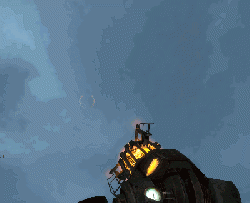Env funnel: Difference between revisions
mNo edit summary |
No edit summary |
||
| Line 1: | Line 1: | ||
[[File:Funnel_animation.gif|right|thumb|Animation of the funnel effect.]] | [[File:Funnel_animation.gif|right|thumb|250px|Animation of the funnel effect.]] | ||
{{base point|env_funnel}} It is an [[Half-Life]] legacy entity: the large portal funnel {{clarify}} | {{base point|env_funnel}} | ||
==Entity description== | |||
It is an [[Half-Life]] legacy entity: the large portal funnel {{clarify}} | |||
This entity creates an effect of glowing particles or sprites that slowly appear then come together at the entity center point creating a glowing center and then slowly disappearing. | This entity creates an effect of glowing particles or sprites that slowly appear then come together at the entity center point creating a glowing center and then slowly disappearing. | ||
Revision as of 14:49, 7 May 2012
Entity description
It is an Half-Life legacy entity: the large portal funnel [Clarify]
This entity creates an effect of glowing particles or sprites that slowly appear then come together at the entity center point creating a glowing center and then slowly disappearing.
This is most likely used in half life when the portal to XEN the alien planet opens. (verify)
The input value "use" is not recognized as a valid input inside hammer but it will function ingame using the targetname of the env_funnel entity and providing "use" as the target input value, you don't need to fill in the parameter override field.
Another way of activating this entity is ingame by using the following command in the developers console: "ent_fire <tagetname_funnel> use" This entity has no other function than showing these particles/sprites. A similar effect can be created by creating a new particle effect yourself.
Keyvalues
- Name (targetname) <string>[ Edit ]
- The name that other entities refer to this entity by, via Inputs/Outputs or other keyvalues (e.g.
parentnameortarget).
Also displayed in Hammer's 2D views and Entity Report.See also: Generic Keyvalues, Inputs and Outputs available to all entities
- Parent (parentname) <targetname>
- Specifies a movement parent. An entity will maintain its initial offset from its parent. An attachment point can be added to the end of the name, separated by a comma.
Flags
- 1 : Reverse
Inputs
- SetParent <string>
- Move with this entity. See Entity Hierarchy (parenting).
- SetParentAttachment <string>
- Change this entity to attach to a specific attachment point on its parent. The entity will teleport so that the position of its root bone matches that of the attachment. Entities must be parented before being sent this input.
- SetParentAttachmentMaintainOffset <string>
- As above, but without teleporting. The entity retains its position relative to the attachment at the time of the input being received.
- ClearParent
- Removes this entity from the the movement hierarchy, leaving it free to move independently.
